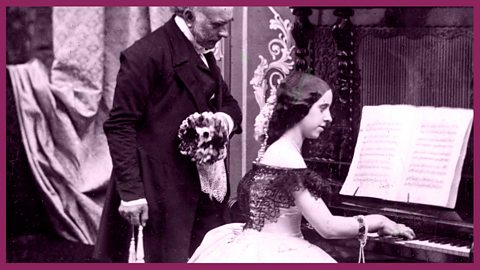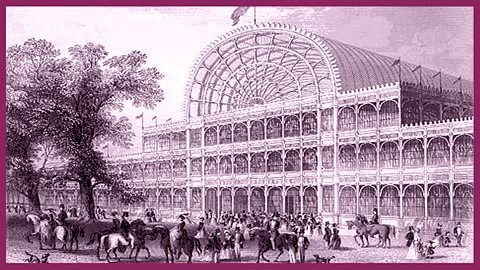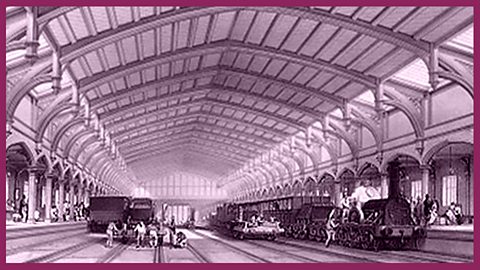Railways - Inventions - Brunel - Seacole - Livingstone - Darling
The railways were to transform Victorian Britain and their development went hand-in-hand with two key industries: iron and coal production. The audio resources on this page explore three important moments in the history of the Victorian railway:
- the use of the first 'iron horses' to transport coal from Hetton colliery
- The Rainhill Trails - the competition held in 1829 to find a locomotive for the nearly completed Liverpool and Manchester Railway
- the Tay Bridge Disaster - the failure of a new railway bridge over the River Tay
1. 'Iron horses': the coming of the railways
Synopsis:
It is the 1820s in North East England and three servants are discussing the arrival of a surprise visitor who has come to see their master, Mr Hindmarsh. The visitor is George Stephenson, who, twenty years previously had worked as a coal-boy, and had courted Mr Hindmarsh’s daughter, Elizabeth. At that time he had been sent packing by Mr Hindmarsh, but in the meantime he has become a successful engineer and inventor, and has returned to ask for permission to marry her.
While Nancy, the youngest servant, is sent to eavesdrop on the master’s conversation with his visitor, Betty reveals that she has secretly been reading Miss Elizabeth’s diary account of George’s achievements, including the invention of ‘iron horses’ that are used to pull huge weights of coal in Hetton Colliery, and which in years to come will be used to transport not only coal, but people as well. Alfred is shocked at this vision of a mechanical future, regarding it as devilish and unnatural. However, then Nancy returns withthe good news that Elizabeth and George are to marry and that the master has called for wine to toast the future.

2. 'Without Equal': 'Sans Pareil', the 'Rocket' and The Rainhill Trials, 1829
Synopsis:
Douglas McCrae, an engineer, is writing to the Museum of Science, offering an old steam locomotive, the ‘Sans Pareil’ (or ‘Without Equal’ in English) for exhibition. He goes on to relate how, in 1829, he worked on the locomotive in the workshop of Timothy Hackworth.
One day, Hackworth informs Douglas of a public trial of locomotives at Rainhill, with a prize for the best engine over 35 miles of £500 and a contract to supply engines for the new Liverpool-Manchester railroad. Hackworth believes the ‘Sans Pareil’ has a chance of winning, but Douglas points out that they can’t make the cylinders for the engines and have to rely on George Stephenson to cast them in his workshop. Hackworth is worried about relying on Stephenson, who is a rival of his and is also entering his locomotive, ‘Rocket’, in the trials.
For the first few days of the trials, the ‘Sans Pareil’ proves to be the equal of the ‘Rocket’, but on the seventh day disaster strikes when a cylinder blows on the ‘Sans Pareil’ and the ‘Rocket’ is hailed the winner. Hackworth believes Stephenson to be guilty ofsabotage, although Douglas doesn’t think so. However, after the trials are over, the directors of the Liverpool-Manchester railroad also buy the ‘Sans Pareil’ to work alongside the ‘Rocket’.

3. The Tay Bridge disaster, 1879
Synopsis:
George tells his granddaughter about an accident that happened in 1879 on the bridge that used to span the River Tay. At that time he was a young man working in the foundry that made the bolts for the new bridge over the river, which at two miles long was the longest bridge in the world and was situated right beneath his cottage. However, his wife, Nessie, never trusted the bridge, particularly as one of the girders supporting the bridge had been damaged after an accident and had been bent back into shape rather than being recast.
One day as they were travelling across the bridge on the train, they heard an ominous noise. When they reached St Fort, on the other side of the bridge, they warned the stationmaster, who calmed their fears. However, that evening there was a storm and, from their cottage, they could hear the girders of the bridge straining. They hoped that the evening mail train would have been stopped, but then they heard it approaching the bridge. They strained to hear what happened to it, but couldn’t hear much above the howling wind.
The next morning they discovered that there had been a terrible accident: the bridge had collapsed and the train had fallen into the river with the loss of all 70 or so passengers on board.

Resources

Ã˝
Ã˝
Play next
Life in a wealthy Victorian family. audio
The story of Emily Anne Barr who lives in a well-off family with servants and a governess

Victorian inventions. audio
‘Victorian inventions’ consists of three episodes about developments in technology during the Victorian era.

Isambard Kingdom Brunel. audio
Isambard Kingdom Brunel consists of three episodes about the Thames Tunnel, The Great Western Railway, and the SS Great Eastern
